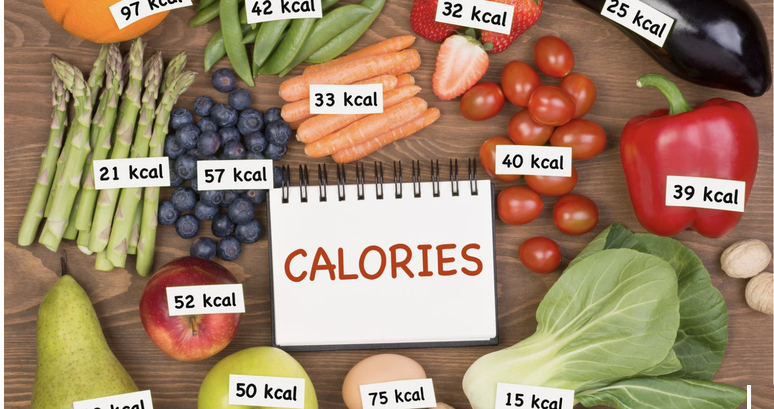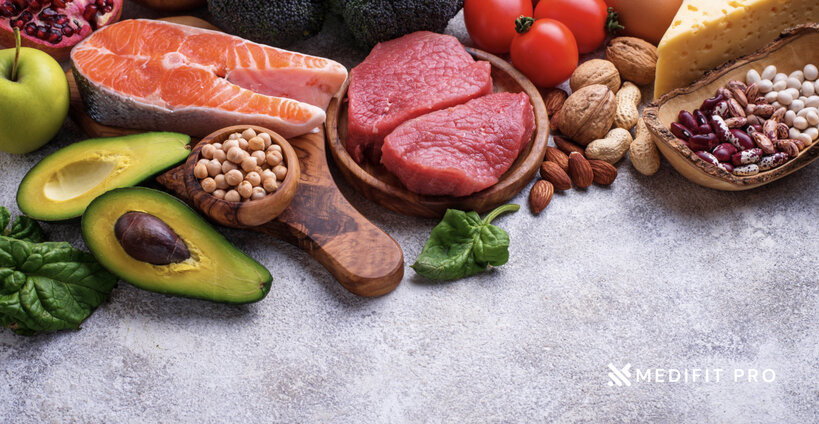Welcome to the exciting world of calories! Have you ever wondered why some foods make you feel energetic while others leave you feeling sluggish? Have you tried counting calories in your diet and found it confusing or overwhelming? Well, look no further! In this article, we’ll be diving into the science behind calories and exploring how they play a crucial role in our health and wellness. Get ready to put on your lab coat and grab your notebook, because we’re about to embark on a journey of discovery and learning that will leave you feeling empowered and informed about the power of calories. So sit back, relax, and let’s get started!
So, What Exactly are Calories?
Simply put, calories are units of energy. They’re the little sparks that ignite in our bodies to provide us with the energy we need to live and thrive. Just like a car needs fuel to run, your body needs energy to carry out daily activities and keep you moving. This energy comes in the form of calories, the little powerhouses that make everything from walking to breathing to thinking possible.
And, Why are Calories so Important?
Understanding calories is key to maintaining a healthy weight and overall well-being. Consuming too many calories and not using enough through physical activity can lead to weight gain and related health problems. On the other hand, consuming too few calories can lead to malnutrition and a lack of energy to carry out daily activities.
In short, calories are the building blocks of our health and fitness and knowing how to balance them is crucial for maintaining a healthy lifestyle. So let’s get started on exploring the science of calories!
Understanding the Basics of Calorie Counting: How do We Measure The Energy Content of Food?
Measuring the energy content of food, or calorie counting, is an important aspect of maintaining a healthy diet. But how exactly do we determine the number of calories in the foods we eat?
The basic unit of measurement for calories is the kilocalorie (kcal), which is often simply referred to as a “calorie.” The amount of energy a food provides is determined through a process called calorimetry. This can be done in a lab setting using specialized equipment or it can be estimated using food nutrition labels.
Food nutrition labels provide a rough estimate of the calorie content of a food. This information is based on the macronutrient content of the food, specifically its fat, protein, and carbohydrate content. Fat contains 9 calories per gram, protein and carbohydrates both contain 4 calories per gram. By multiplying the amount of each macronutrient in a serving of food by its respective calorie content, we can estimate the total number of calories in that serving.
It’s important to note that while calorie counting can be a useful tool, it’s not an exact science. Factors such as cooking methods, food processing, and individual differences in absorption and metabolism can impact the actual number of calories we extract from the foods we eat. However, by understanding the basics of calorie counting and using food nutrition labels as a guide, we can make informed decisions about the foods we eat and maintain a healthy diet. To learn how to calculate calories, click https://medifitpro.com/weight-loss/calories-calculation/
or simply use our Calorie Calculator
The Science Behind Calories: How do Our Bodies Use and Store Energy from food?
The science behind calories is truly fascinating! When we eat food, our bodies break down the carbohydrates, fats, and proteins in the food into their respective building blocks. These building blocks are then used by our bodies for energy and stored for future use.
Carbohydrates are broken down into glucose, which is our body’s preferred source of energy. Glucose is transported to our cells where it’s burned for energy or stored as glycogen in our liver and muscles for later use.
Fats are broken down into fatty acids, which can be used for energy or stored in our fat cells for future use. Our bodies also use fat for energy during periods of low glucose, such as during periods of exercise or when we haven’t eaten in a while.
Proteins are broken down into amino acids, which can be used for energy, stored as fat, or used to build and repair muscle tissue.
Our bodies are incredibly efficient at balancing energy intake and expenditure. When we eat more calories than we need for energy, our bodies store the excess as fat for future use. When we eat fewer calories than we need, our bodies draw on stored fat for energy. This is why calorie balance is so important – by understanding the science behind calories, we can make informed decisions about the foods we eat and maintain a healthy weight.
The impact of diet and exercise on calorie balance: how do these factors influence weight loss or gain?
Diet and exercise are two of the most important factors that influence calorie balance and ultimately determine weight gain or loss.
When it comes to diet, calorie balance is simple: if we consume more calories than we use, we will gain weight, and if we consume fewer calories than we use, we will lose weight. This is why counting calories can be an effective tool for weight management. By being mindful of the calorie content of the foods we eat and making informed choices, we can maintain a healthy calorie balance.
Exercise also plays a crucial role in calorie balance. Physical activity burns calories, which helps us maintain a healthy weight. The amount of calories burned through exercise depends on the type, intensity, and duration of the activity. For example, vigorous activities like running or playing basketball burn more calories than light activities like walking or stretching. By incorporating regular physical activity into our daily routines, we can increase the number of calories we use and maintain a healthy weight.
It’s also important to note that the type of food we eat can impact the number of calories we use and store. Foods that are high in fiber and protein tend to be more filling, which can help us regulate our calorie intake. On the other hand, foods that are high in sugar and fat tend to be less filling and can lead to overeating and weight gain. By being mindful of the types of foods we eat, we can make informed choices that support a healthy calorie balance and weight.
In conclusion, diet and exercise play a crucial role in determining calorie balance and ultimately, weight gain or loss. By understanding the impact of these factors and making informed choices, we can maintain a healthy weight and overall well-being. To get more information about weight loss, click https://medifitpro.com/nutrition-and-diet/20-myths-about-weight-loss-debunked/
Debunking Common Calorie Myths: Separating Fact From Fiction in The World of Weight Management
The world of weight management is filled with a plethora of myths and misconceptions about calories. Separating fact from fiction is crucial for making informed decisions about our diet and exercise routines. Here are some common calorie myths and the truth behind them:
Myth 1: “A calorie is a calorie, regardless of its source.”
Truth: While it is true that all calories provide energy, the source of the calories can have a significant impact on our bodies. For example, calories from nutrient-dense whole foods like fruits, vegetables, and lean proteins provide us with essential nutrients, while calories from junk food and sugary drinks can lead to weight gain and negative health outcomes.
Myth 2: “Eating late at night causes weight gain.”
Truth: The timing of our meals doesn’t have a direct impact on weight gain. What matters most is the overall calorie balance. If we consume more calories than we use, we will gain weight, regardless of the time of day.
Myth 3: “Low-fat or fat-free foods are always a healthy choice.”Truth: Not all low-fat or fat-free foods are created equal. Some low-fat or fat-free foods are high in sugar, salt, and other unhealthy additives, which can have negative impacts on our health. It’s important to always read food labels and choose nutrient-dense, whole foods to support a healthy diet.
Myth 4: “Skipping meals can help you lose weight.”
Truth: Skipping meals can actually lead to weight gain. When we skip meals, we’re likely to overeat later in the day, which can result in a higher overall calorie intake. Additionally, skipping meals can slow down our metabolism, which makes it harder for our bodies to burn calories.
By debunking these common calorie myths, we can make informed decisions about our diet and exercise routines, and ultimately, achieve our weight management goals. For more weight loss myths, click https://medifitpro.com/nutrition-and-diet/20-myths-about-weight-loss-debunked/
The role of metabolism in calorie balance: how does our metabolic rate affect the way we process and use energy from food?

Metabolism is the process by which our bodies use and store energy from food. Our metabolic rate, or the speed at which we use energy, is influenced by a variety of factors, including age, gender, genetics, and body composition. Understanding the role of metabolism in calorie balance is essential for effective weight management.
A high metabolic rate means that our bodies use energy quickly, which can make it easier to maintain a healthy weight. On the other hand, a slow metabolic rate means that our bodies use energy slowly, which can make it harder to lose weight.
Role of Muscle Mass in Metabolism
One of the key factors that influences our metabolic rate is muscle mass. Muscle tissue is more metabolically active than fat tissue, meaning that it burns more calories even at rest. This is why regular exercise, particularly strength training, can help increase our metabolic rate and support weight loss.
Role of Food in Metabolism
Another factor that affects our metabolism is the type of food we eat. Some foods, such as protein-rich foods, require more energy to digest, which can boost our metabolic rate. On the other hand, diets high in sugar and processed foods can slow down our metabolism and lead to weight gain.
Role of Age in Metabolism
It’s also important to note that as we age, our metabolic rate naturally slows down, which can make it harder to maintain a healthy weight. However, this can be counteracted by maintaining a healthy diet and engaging in regular physical activity.
In conclusion, metabolism plays a crucial role in calorie balance and weight management. By understanding how our metabolic rate is influenced by factors like muscle mass, diet, and age, we can make informed choices that support a healthy weight and overall well-being.
The importance of a balanced diet for optimal calorie balance: why variety and moderation are key to a healthy diet.
Balancing our diet is crucial for achieving optimal calorie balance and maintaining a healthy weight. While it’s important to be mindful of the number of calories we consume, the quality of the calories is equally important. A balanced diet is one that provides our bodies with the nutrients we need to thrive, while also helping us control our calorie intake.
Variety is key to a balanced diet. By incorporating a range of nutrient-dense foods, such as fruits, vegetables, whole grains, lean proteins, and healthy fats, we ensure that we’re getting all the essential nutrients our bodies need. This can help us feel satisfied and prevent overeating, which is often a factor in weight gain.
Moderation is also important when it comes to calorie balance. While it’s okay to treat ourselves every once in a while, consuming large amounts of high-calorie, high-fat, or high-sugar foods on a regular basis can lead to weight gain and negative health outcomes.
It’s also important to be mindful of portion sizes. Overeating, even of healthy foods, can lead to an excess of calories and weight gain. A good rule of thumb is to eat until we’re satisfied, not full, and to listen to our bodies’ hunger and fullness signals.
Putting it all together: creating a calorie controlled diet that works for you and your lifestyle
Putting all the pieces together and creating a calorie-controlled diet that works for you and your lifestyle can seem like a daunting task. However, with a few simple strategies, you can create a diet that’s both delicious and nutritious, while also supporting your weight management goals.
The first step is to determine your daily calorie needs based on your age, gender, weight, height, and level of physical activity. This information will help you determine how many calories you need to consume each day to maintain your weight.
Next, make sure to include a variety of nutrient-dense foods in your diet, such as fruits, vegetables, whole grains, lean proteins, and healthy fats. This will help ensure that you’re getting all the essential nutrients your body needs, while also controlling your calorie intake.
It’s also important to be mindful of portion sizes and to listen to your body’s hunger and fullness signals. Avoid skipping meals or going for long periods without eating, as this can lead to overeating later on. Instead, aim to eat several smaller, balanced meals throughout the day.
Incorporating physical activity into your lifestyle is also crucial for maintaining a healthy weight. Regular exercise not only burns calories, but it also boosts your metabolic rate, which can help you maintain a healthy weight even when you’re not actively working out.
Finally, be patient with yourself and don’t be too hard on yourself if you slip up. Weight management is a journey, and it’s normal to experience ups and downs along the way. The important thing is to keep moving forward and to stay focused on your goals.
In conclusion, creating a calorie-controlled diet that works for you and your lifestyle is achievable with a little planning and effort. By incorporating variety, moderation, physical activity, and patience into your diet and lifestyle, you can reach your weight management goals and enjoy optimal calorie balance.
References
- Dietary Guidelines for Americans – United States Department of Agriculture (USDA) https://www.dietaryguidelines.gov/
- Principles of Human Nutrition – World Health Organization (WHO) https://www.who.int/nutrition/publications/nutrientrequirements/en/





























Recent Comments